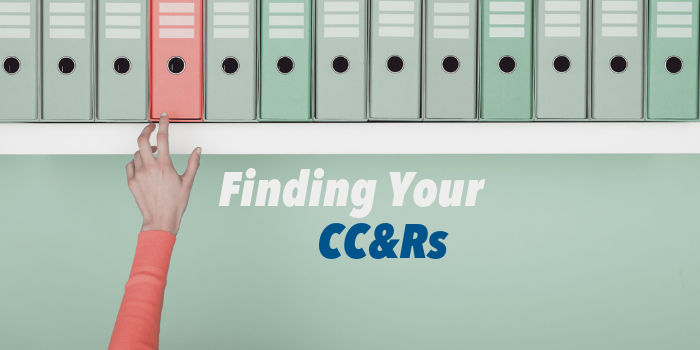CC&Rs, or the covenants, conditions, and restrictions, are rules that homeowners living in a certain area are required to abide by. They are also sometimes referred to as the association’s governing documents. The CC&Rs often contain building restrictions and space limitations, decorative limitations, prohibitions on non-residential uses of property, pet restrictions, fence limitations, and yard maintenance requirements. CC&Rs also lay out the types of dues and assessments that will be required for those living in the community, as well as penalties for nonpayment.
CC&Rs Before You Buy
When you close on a new home, you’ll be required to sign a set of papers acknowledging that you have read the CC&Rs and agree to abide by them. Your realtor, builder, or seller should be able to provide you with a copy of the CC&Rs. If they are unable to do so, they should at least be able to get the contact information for the board members of the HOA so that you can request a copy for yourself so that you know what you are agreeing to before you sign. Be sure to keep a copy of these documents for yourself so that you are able to reference them whenever you may have the need.
For Existing Owners
If you have been living in your house for a while, or find that you have lost your copy of the CC&R’s, finding a new copy can be frustrating. Be advised that the HOA board may be able to charge for copies of the HOA documents, especially in cases where you receive a physical copy. Any applicable fees will be detailed in the governing documents.
If your HOA uses a management company, it may be as easy as calling the management company to get the information and/or documents that you need. This is the best-case scenario, and just one of many ways that an HOA management company is useful for HOA board members. Sometimes you may be required to write a letter or email requesting the information and/or documents. If your HOA does not use a management company, and you do not know who the members of your HOA Board are or how to contact them, don’t fret, there are other ways of finding that information.
Other Copies of Your CC&RS
The CC&Rs must be recorded with the county recorder’s office in order to create certain restrictions on the property and provide recorded notice of the contractual obligations on the deed to prospective buyers. You should be able to find a copy of the CC&Rs on your county assessor’s official government website. If the document is not there, you will at least be able to find the contact information for a person who can help you. In order for them to help, you may need to subdivision name, property address, owner’s name and/or the parcel ID number.
Related: Everything you need to Know about HOA Bylaws, Regulations and CC&Rs
Another option is to find the association’s contact information by visiting your state’s corporation commission website. Most states require that the articles of incorporation and annual reports be filed regularly. With those reports and articles, you should be able to find the principal physical address, mailing address, and officer information so that you will how to contact an officiating member of the homeowners association.
Before taking any of these measures, it may be as simple as an internet search or chatting with a few neighbors or friends to see if they have a copy of the CC&Rs or the contact information for someone on the board so that you don’t have to do too much hunting.








Is there a place where I can get a example copy of CC&R’s for a commercial center
How do I obtain a copy of the CC&R’s for La Florentine association in San Diego?
How do I obtain a copy of CC&R for Las Bolsas Homeowners Association in Santa Ana, California